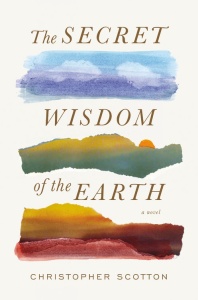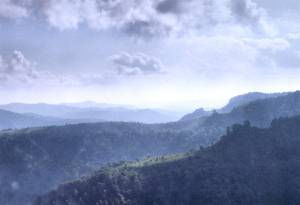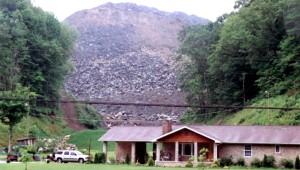 “Simple beauty,” “simple dignity” versus entrenched, complex issues: Appalachian Life in a Coal Mining Community (Eastern Kentucky, contemporary): Secret Wisdom is a perfect title for this multi-layered, standout novel. It steers us to concentrate on all that is good and beautiful, rather than evil and destructive, in a fictitious town nestled in the hollows (or hollers) in-between the mountains and hills of eastern Kentucky Appalachia, where “scratch-a-living” lives have depended on coal mining since the early 1900s.
“Simple beauty,” “simple dignity” versus entrenched, complex issues: Appalachian Life in a Coal Mining Community (Eastern Kentucky, contemporary): Secret Wisdom is a perfect title for this multi-layered, standout novel. It steers us to concentrate on all that is good and beautiful, rather than evil and destructive, in a fictitious town nestled in the hollows (or hollers) in-between the mountains and hills of eastern Kentucky Appalachia, where “scratch-a-living” lives have depended on coal mining since the early 1900s.
Medgar, Kentucky in Missiwatchiwie County may be a place name that exists only in debut novelist Christopher Scotton’s imagination (I googled to verify), but the novel mirrors real-life Appalachian concerns. It may also be a place “people didn’t move into,” except for one life-changing summer when our youthful narrator, Kevin Goolihy, did just that at age fourteen, with his grief-stricken mother.
Eastern Kentucky is where President Johnson came fifty years ago to launch his War on Poverty. Then, poverty rates were 50%; today they’re 33%, still making counties here some of the poorest in the nation. Progress? And at what cost? These are some of the profound questions Scotton wants us to think about. And we do, thanks to his exceptional prose that rises to elegant when evoking serene landscapes of “monumental trees,” waterfalls, and canyons, or when musing on the ups-and-downs of the coal mining industry (the “bountiful plenty” compared to the “staggering lean”); prose that’s sprinkled with wisdoms, and brimming with authentic dialogue.

Eastern Kentucky Appalachian Mountains
(Brandon Goins at en.wikipedia [CC BY-SA 3.0],
from Wikimedia Commons)
I gravitated to the novel because coal mining in Appalachia has been getting a lot of press lately. Besides John Grisham’s bestselling Gray Mountain, Robert F. Kennedy Jr.’s recent editorial in the New York Times discusses two major cases involving safety and environmental contamination issues. And yes, the soulful title grabbed my attention. Indeed, this is a soulful tale.
On one level it’s a heartwarming, coming-of-age story of a “singular summer when we left the coverings of boy behind.” The “we” our narrator refers to is the new teenage friend he makes when he arrives in Medgar from Indiana, with his nearly silent mother, to his grandfather’s Appalachian home. Buzzy Fink’s real name is Elrod Fink. We’re told quirky character names “tend to stick” around these parts. Buzzy’s father is dying of black lung disease. Kevin and Buzzy come from different worlds, yet they form an “easy friendship unburdened by the expectations of others.”
One reason their friendship blossoms is the nurturing of Pops. Arthur Bradley Peebles is a distinguished veteran and former philosophy professor turned large animal veterinarian, whose wise words are intended to help heal his grandson, who is carrying a burden of blame for the tragic death of his toddler brother, Joshua. Pops, who grew up in Jukes Hollow, “one of the most beautiful places I’ve ever seen,” would rather die that sell off his land (like others are doing) to Bubba Boyd, owner of the Monongahela mining company. Big money and greed are powerful forces to be reckoned when a town’s livelihood “was always coal.”

Coal Mining’s Impact in Eastern Kentucky
(Flashdark [Public domain], via Wikimedia Commons)
Today, stricter environmental laws are making it too expensive to mine in Eastern Kentucky where the coal is high in sulfur (when it rains it becomes acid rain, or corrosive sulphuric acid). The result are people leaving, abandoning mines, gas stations, and “storefronts like October cornstalks.” Still, some local businesses have survived like Hivey’s Farm Supply and Miss Janey’s Paris Hair Salon and Notion Shop, owned by Paul Pierce, one of the “good people.” Paul’s character brings out the goodness in the town’s people (he secretly delivers turkeys to feed forty families), as well as deep prejudices and hatreds. Pops’ front porch – 22 Chishold Street – is another locale where the novel’s many characters gather, talk, and drink sour mash whiskey.
Another reason the reading flows is the short chapters, with catchy headings like What Horses Smell Like After the Rain, The Telling Cave, The Aerodynamics of Flyrock, The Next Best Kings of the Earth, The Occasional Shifting of Boot Sole on Pine, Two Hearts Beating Each to Each, How to Carve a Whistle Out of Green Willow, In the Weave of Time and Being, and Needfuls.
Although evil lurks and sweeps into town, Pops’ wisdom and impact on Kevin and Buzzy uplift us. He’s an endearing man, still deeply in love with Sarah Winthrope. (“It wasn’t her beauty that won me over. It was the way she smiled from her eyes.”) Sarah, a fine lady, was the 29-year-old wife he lost at childbirth; Kevin’s mother survived. Pops’ wisdom is plentiful and shines:
- “friends can sometimes disappoint”
- “coveting is one of the three basic human emotions, right behind love and fear”
- “hate is overrated. People only hate if they can’t attain what they covet”
- “evil doesn’t have to be loud, son … Evil is quiet, stealthy”
- “focus on the local … what folks know and can see and touch”
- “most folks can be astoundingly brave or dog cowards depending on the circumstances”
- “son, the more people I meet, the less good I get at labeling them”
Beyond the layers of personal growth and healing, economic, environmental, and cultural issues tackled, The Secret Wisdom of the Earth is a heroic, page-turning “tramp” deep into mountains that “have their own memories.” Pops takes Kevin and Buzzy on a camping adventure into remote Daniel Boone country. They learn to catch rabbit, fish for largemouth bass, make use of wood sorrel, wild onions, watercress, black trumpet, wild garlic, chanterelle, shaggymane, goldenseal, and far more. Theirs is a “watermark” experience that’s the stuff of character-making. It changed them from boys into men.
“Isn’t it something, Buzzy?” divined Kevin. “Ain’t it just.”
Happy New Year, and thanks for reading Enchanted Prose in 2014, Lorraine
I am 2/3 into the book and hypnotized by its beauty and simplicity. I find it hard to put it down.
Hi Michel,
I hope the PB is even more widely read as I agree — it’s gorgeous storytelling. I read somewhere that the 2015 HB was considered the most underrated novel of the year. Thanks for writing.